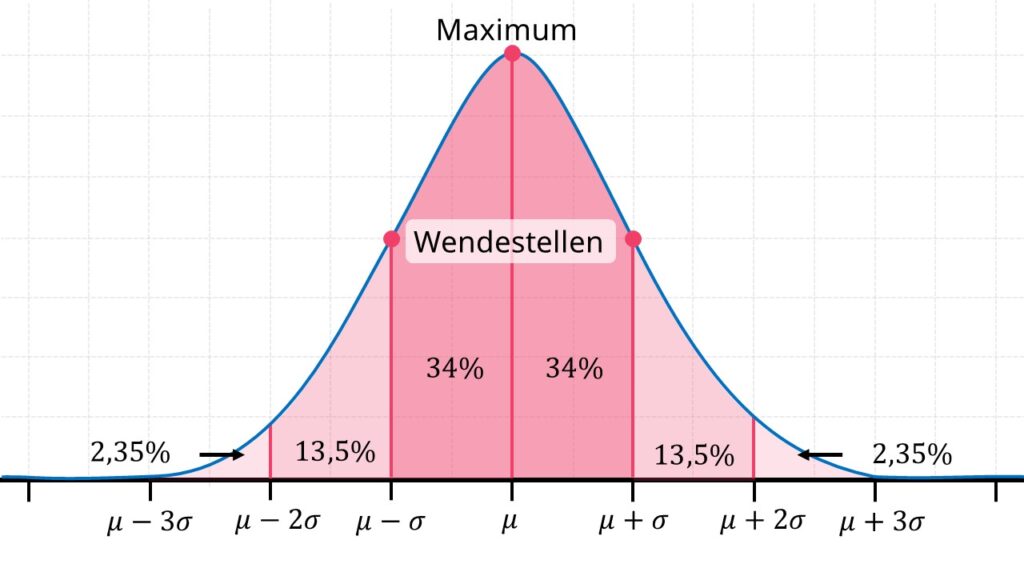Gaußverteilung Skalarer Fall (1D) f ( x ) = 1 2 π σ exp { − 1 2 ( x − x ^ ) 2 σ 2 }
f(x)=\frac{1}{\sqrt{2 \pi} \sigma} \exp \left\{-\frac{1}{2} \frac{(x-\hat{x})^{2}}{\sigma^{2}}\right\}
f ( x ) = 2 π σ 1 exp { − 2 1 σ 2 ( x − x ^ ) 2 } Erwartungswert
E f { x } = x ^
E_{f}\{x\}=\hat{x}
E f { x } = x ^ Varianz
E f { ( x − x ^ ) 2 } = σ 2
E_{f}\left\{(x-\hat{x})^{2}\right\}=\sigma^{2}
E f { ( x − x ^ ) 2 } = σ 2 Given the parameters μ \mu μ σ \sigma σ f ~ x \tilde{f}_x f ~ x f ~ x \tilde{f}_x f ~ x
2D Normalverteilung f x y ( x , y ) = 1 2 π σ x σ y 1 − r 2 exp { − 1 2 Q ( x , y ) } Q ( x , y ) = 1 1 − r { ( x − x ^ ) 2 σ x 2 − 2 r x − x ^ σ x y − y ^ σ y + ( y − y ^ ) 2 σ y 2 }
\begin{aligned}
f_{x y}(x, y)&=\frac{1}{2 \pi \sigma_{x} \sigma_{y} \sqrt{1-r^{2}}} \exp \left\{-\frac{1}{2} Q(x, y)\right\} \\
Q(x, y)&=\frac{1}{1-r}\left\{\frac{(x-\hat{x})^{2}}{\sigma_{x}^{2}}-2 r \frac{x-\hat{x}}{\sigma_{x}} \frac{y-\hat{y}}{\sigma_{y}}+\frac{(y-\hat{y})^{2}}{\sigma_{y}^{2}}\right\}
\end{aligned}
f x y ( x , y ) Q ( x , y ) = 2 π σ x σ y 1 − r 2 1 exp { − 2 1 Q ( x , y ) } = 1 − r 1 { σ x 2 ( x − x ^ ) 2 − 2 r σ x x − x ^ σ y y − y ^ + σ y 2 ( y − y ^ ) 2 } r ∈ [ − 1 , 1 ] r \in [-1, 1] r ∈ [ − 1 , 1 ] ρ \rho ρ Alternativ
f x y ( x , y ) = N ( [ x y ] , [ x ^ y ^ ] , [ C x x C x y C y x C y y ] )
f_{x y}(x, y)=\mathcal{N} \left(\left[\begin{array}{l}
x \\
y
\end{array}\right],\left[\begin{array}{l}
\hat{x} \\
\hat{y}
\end{array}\right],\left[\begin{array}{ll}
C_{x x} & C_{x y} \\
C_{y x} & C_{y y}
\end{array}\right]\right)
f x y ( x , y ) = N ( [ x y ] , [ x ^ y ^ ] , [ C xx C y x C x y C yy ] ) mit
[ c x x c x y c y x c y y ] = [ σ x 2 r σ x σ y r σ x σ y σ y 2 ]
\left[\begin{array}{ll}
c_{x x} & c_{x y} \\
c_{y x} & c_{y y}
\end{array}\right]=\left[\begin{array}{lc}
\sigma_{x}^{2} & r \sigma_{x} \sigma_{y} \\
r \sigma_{x} \sigma_{y} & \sigma_{y}^{2}
\end{array}\right]
[ c xx c y x c x y c yy ] = [ σ x 2 r σ x σ y r σ x σ y σ y 2 ] Correlationskoeffizient Correlation of bivariate Gaussian distribution (ρ \rho ρ
unkorreliert (r = 0 r = 0 r = 0
⇒ x , y \Rightarrow \boldsymbol{x}, \boldsymbol{y} ⇒ x , y ⇒ \Rightarrow ⇒ x , y \boldsymbol{x}, \boldsymbol{y} x , y f x , y = f x ( x ) f y ( y ) f_{\boldsymbol{x}, \boldsymbol{y}} = f_{\boldsymbol{x}}(x) f_{\boldsymbol{y}}(y) f x , y = f x ( x ) f y ( y ) positiv korreliert (r > 0 r > 0 r > 0
positiv korreliert (r < 0 r < 0 r < 0
N N N f x ( x ) = 1 ( 2 π ) N ⋅ ∣ C ∣ exp { − 1 2 ( x ‾ − x ^ ‾ ) ⊤ C − 1 ( x ‾ − x ^ ‾ ) }
f_{\boldsymbol{x}}(x)=\frac{1}{\sqrt{(2 \pi)^{N} \cdot|\mathbf{C}|}} \exp \left\{-\frac{1}{2}(\underline{x}-\underline{\hat{x}})^{\top} \mathbf{C}^{-1}(\underline{x}-\underline{\hat{x}})\right\}
f x ( x ) = ( 2 π ) N ⋅ ∣ C ∣ 1 exp { − 2 1 ( x − x ^ ) ⊤ C − 1 ( x − x ^ ) } x ^ ‾ \underline{\hat{x}} x ^ C \mathbf{C} C 
